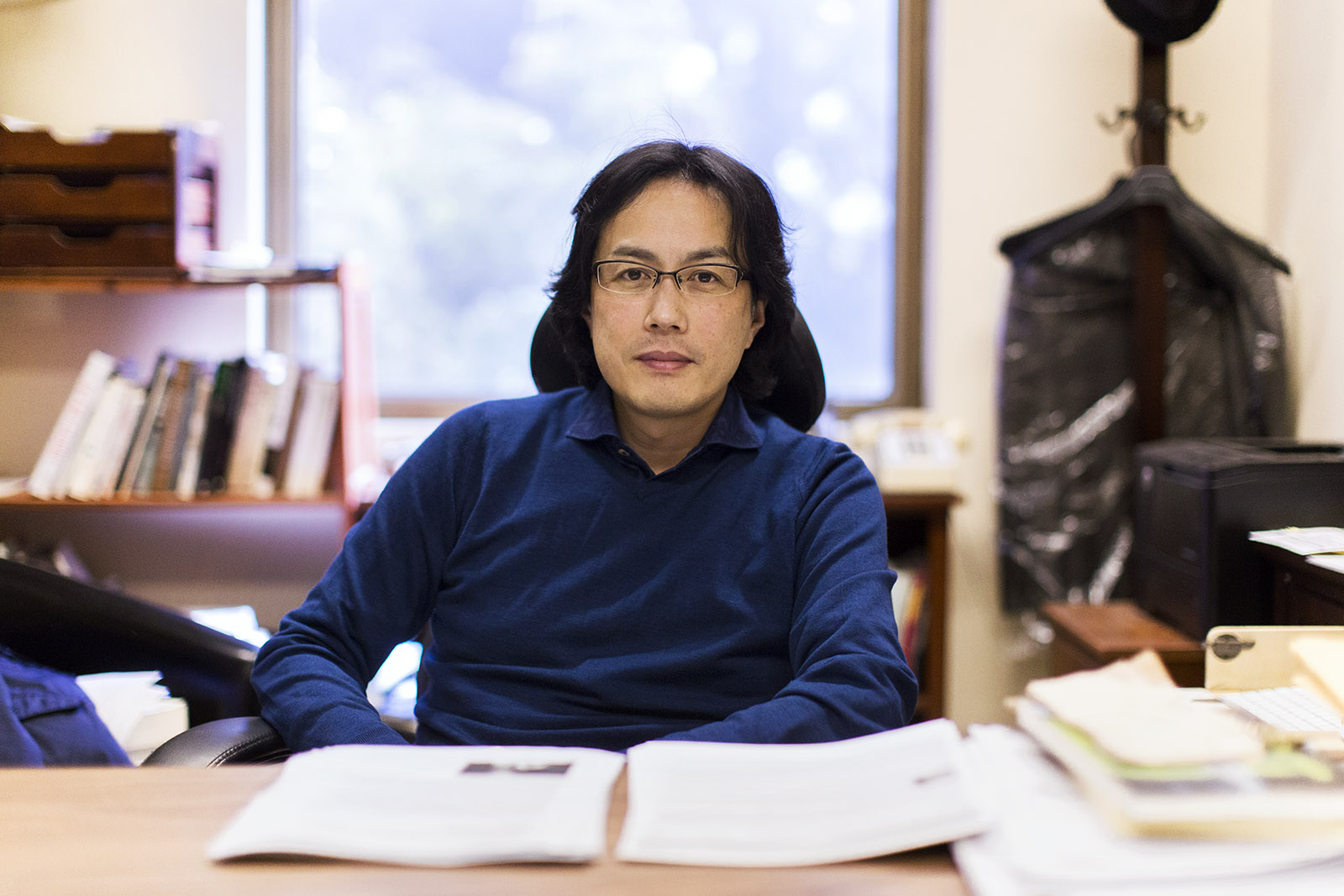Fukushima disaster prompts history professor to investigate Japan

History professor Katsuya Hirano grew up in Hitachinaka, Japan and investigates what he thinks is purposeful coordination between the government, major media outlets and energy companies to profit from nuclear energy despite the risks. (Marley Maron/Daily Bruin)
Katsuya Hirano grew up in Hitachinaka, Japan, where he said the government led citizens to believe nuclear energy was harmless. Now, after several nuclear accidents, the public is less willing to believe what Hirano calls the “safety myth.”
The 2011 Fukushima disaster prompted Hirano, a history professor, to investigate what he thinks is purposeful coordination between the government, major media outlets and energy companies to profit from nuclear energy despite the risks.
He began compiling an oral history of the event by interviewing individuals affected by and involved in Japan’s nuclear energy policy. His next interview will be published Friday in The Asia-Pacific Journal, to observe the fifth anniversary of the Fukushima accident.
The magnitude 9.0 earthquake and subsequent tsunami that struck Japan in March 2011 triggered three nuclear meltdowns that left hundreds of thousands of Japanese homeless, wrote The New York Times.
Hirano said he thinks the government initially downplayed the seriousness of the 2011 nuclear meltdowns, evacuating only residents who lived within a 2-kilometer radius of the power plant. Government officials later expanded the evacuation radius to 20 kilometers, after realizing the severity of the situation.
Last May, the journal published Hirano’s first article, which included an interview with Murakami Tatsuya, former mayor of Tokaimura, the site of nuclear accidents in 1997 and 1999. Tatsuya compared nuclear energy to a drug, alleging governments and energy companies have become addicted to its profitability.
Hirano said his research mostly focuses on post-feudal Japan, but his investigation of Fukushima has led him to believe the Japanese government obstructs democracy and transparency to bolster a strong national identity and maximize profit.
“(Japan’s nuclear energy policy) is a fundamentally undemocratic energy policy,” Hirano said. “No one benefits from this other than energy companies and maybe the government, too.”
Toulouse Antonin Roy, a graduate student in history who researches colonial Japan, said he applied to UCLA because he had heard of Hirano’s work. He said he hoped to collaborate with Hirano because they research similar topics.
Roy said he thinks the central government has historically neglected Japan’s northeast islands, which host both Fukushima and Tokaimura. During the post-war period, the government sanctioned the area for nuclear power development.
“Essentially, (the cities) were sacrificed in the name of nuclear power and national progress,” he said.
Roy said Hirano’s work helped him understand the Fukushima disaster as more than a consequence of the Japanese government’s policy or mismanagement.
“The problem is a lot more systemic,” he said. “There’s a history that goes back to the marginalization of Japan’s northeast and the creation of a nuclear regime that disproportionately affects this area.”
Hirano’s second interviewee Koide Hiroaki, a nuclear scientist who denounces nuclear energy, called the Japanese government’s actions criminal. Hirano said he thinks the government not only encourages people to return to the area, but also encourages people in other areas to consume produce from Fukushima, despite remaining radiation effects.
In 1999, a nuclear facility in Tokaimura, near his hometown, exploded. His parents called him and asked whether they should leave their home or stay indoors, as the government instructed.
Seven years after the accident, his father died of cancer, one of many victims in the area.
Hirano said scientists haven’t proved that radiation causes cancer, but he said he suspects a relationship between the two because of the rise in cancer deaths in areas exposed to radiation. He added he felt history was repeating itself when the Fukushima crisis began in 2011, and the government continued to support nuclear energy.
Yoh Kawano, a graduate student in urban planning, said he has plans to visit Fukushima again this June to map and collect data from the disaster site.
Following the earthquake, Kawano joined a worldwide group of medical doctors and nuclear physicists. The team periodically visits Fukushima to document the disaster site through photography, videography, radiation measurements and interviews with residents living near the evacuation zone.
Kawano said he was interested in observing how the earthquake impacted the surrounding landscape, and how the damage would affect future construction on contaminated sites.
“Every time you go back you learn something new,” Kawano said. “(Japanese people’s) sentiments (about the disaster) are always changing.”
Hirano said he plans to go to Fukushima this summer with Kawano to interview families displaced by the Fukushima disaster, who have lived in temporary housing since 2011. He has already interviewed Muto Ruiko, a Fukushima resident and anti-nuclear activist, and Kamanaka Hitomi, a documentarian. Each interview will be translated into English before being published to reach a broader audience, he added.
Hirano said he thinks nuclear energy dependency is increasing globally, and wants to make communities aware of the consequences of short-sighted nuclear energy policy.
“(The) radiation will never disappear,” Hirano said. “The damage and contamination has a much longer life than human civilization – (a part of) of Fukushima is gone now.”

